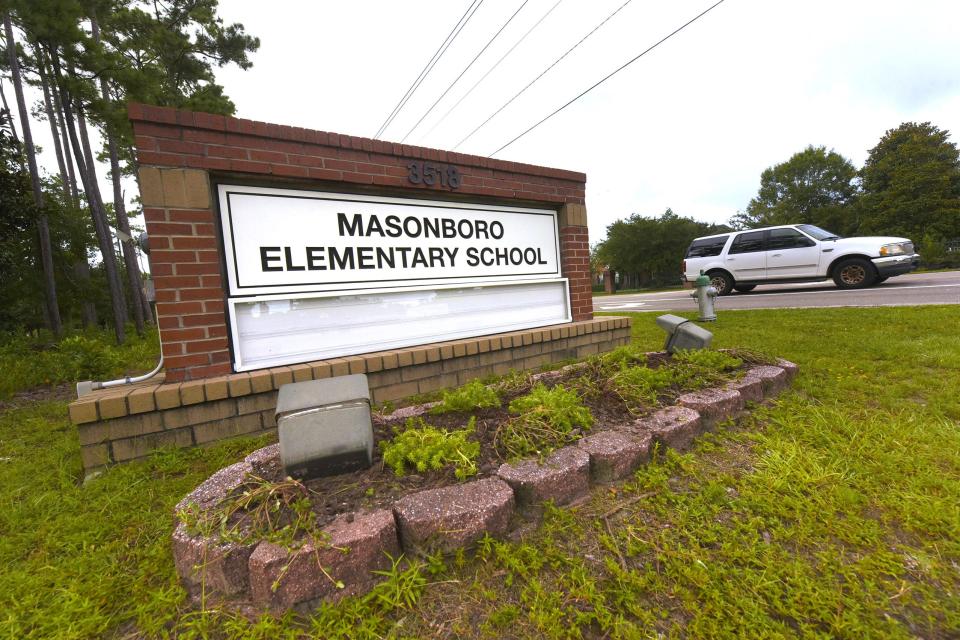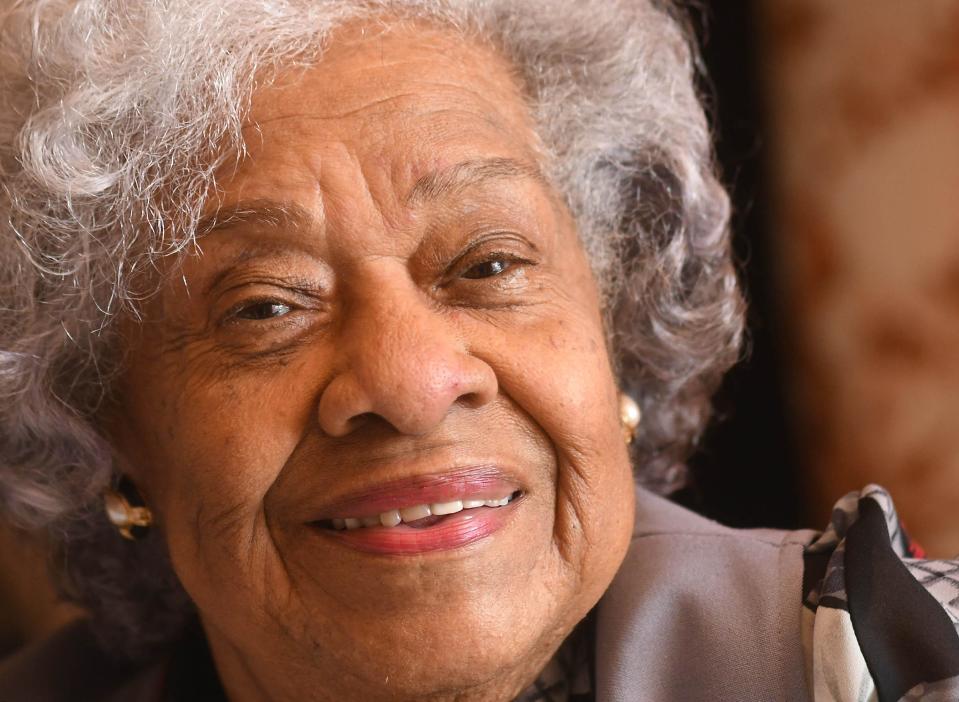A school was named after a violent white supremacist. For years no one knew who he was.
- Oops!Something went wrong.Please try again later.
Two days after a tightly contested election in the fall of 1898, a white supremacist mob descended on Wilmington, North Carolina — a Southern oasis of Black prosperity during the Reconstruction era — to take back the city from “Negro rule.”
The rioters razed long-standing Black businesses, burned down the city’s only Black newspaper, and overthrew a mixed-race, democratically elected city council in what is considered the only successful coup in American history.
More than a century after scores of Black residents were killed in the insurrection, Wilmington named an elementary school after one of its ringleaders: Walter L. Parsley.
No one protested when school board members approved Parsley’s name in 1999, and the tribute survived for 21 years. But by summer 2020, local activists had connected the name to one of the coup’s leaders, stirring fury and a petition drive to change it.

When she discovered her former school namesake's violent past, “the feeling was rage. It was frustration. It was anger,” said Taylor White, who is Black. “But also just a realization that things really haven't changed that much.”
A nationwide effort to rename schools
The push to rename Parsley Elementary and other landmarks representing 1898 coup leaders mirrored hundreds of crusades across the country to jettison symbols of historic racism following George Floyd’s murder and subsequent protests. The effort sparked local discussion about how 1898 should be memorialized in one of the most segregated school districts in the country.
82 schools removed racist names: Dozens now honor people of color.
Schools have become a focal point in these debates. And school name changes have come to symbolize intensifying culture wars nationwide.
Between May 2020 and December 2021, more than 80 schools with controversial namesakes changed their names, a USA TODAY analysis of federal education data found. Schools and monuments honoring prominent Confederate figures — including General Robert E. Lee and President Jefferson Davis — were targeted immediately and relentlessly.
82 schools that have changed their names since 2020
But Walter L. Parsley Elementary — now Masonboro Elementary — remained inconspicuous until community members looked deeper. Even in Wilmington, the site of the coup, “a lot of people did not know what Parsley represented,” said Deborah Dicks Maxwell, president of North Carolina’s NAACP.
'It's the right thing to do': Florida school board votes to rename 6 Confederate-named schools
Parsley’s history discovered accidentally
Unlike Lee and Davis, Parsley’s name was not peppered all over town squares or featured in history textbooks. Some Wilmington residents discovered Parsley’s significance by accident.
Ryan Chapman, a former high school history teacher in Wilmington, began teaching his class about the atrocities of 1898 years before Floyd’s murder shook the country. One class period, he said, a student pulled up a list of the “Secret Nine,” the conspirators who plotted the massacre, and stopped cold at Parsley’s name: “Isn’t this the Parsley that the elementary school is named after?” he remembers the student asking.

Amber Moore, who is Black and was one of Chapman’s students, remembers that class period vividly: “It's a slap in the face to me and to my family” that 1898 wasn’t widely taught, she said. “But I’m not surprised at the same time.” Moore said fellow Wilmingtonians often “turn the other cheek” when discussions about racism bubble up.
“The entire thing is pretty shocking to students,” said Chapman. “They're all just kind of sitting back like, ‘Why have I never heard of this?’”
Shocking discovery: My college found slave artifacts on campus. Here’s how we responded.
What happened in Wilmington in 1898?
In the nights leading up the 1898 statewide elections, Parsley and eight other co-conspirators planned the government takeover at his Market Street home, according to a 1936 pamphlet by local journalist Harry Hayden.
As reporters at the local Black newspaper — the Daily Record — began writing up election results on Nov. 10, 1898, exactly 124 years ago, about 500 white businessmen and Civil War veterans, armed with rifles and racial animosity, barged into the paper’s headquarters and set the building ablaze. The insurrection then swelled to 2,000-strong across town, as the attackers spread now-debunked rumors that Black journalists had fired first.
But the coup wasn’t discussed much otherwise or a regular part of history lessons. On purpose.

“Blacks were scared to speak out,” said Bertha Todd, 93, who co-chaired the 1898 Centennial Foundation and has lived in Wilmington since the ‘50s. Over the years, Todd has spoken to numerous Black residents about the pain of 1898. One remark from a lifelong Wilmingtonian sticks in her mind: “You ran us out of town. You killed some of us off, and the rest of us who remained here put our heads in the sand and tried to make it go away.”
Not so fast: San Francisco suspends plan to rename third of city's public schools after backlash
And, for decades, the records were kept from the public. With the Black newspaper in ruins, other local papers echoed the attackers’ narrative. The Raleigh News & Observer accused Black Wilmingtonians of “precipitat[ing] conflict” and the Winston-Salem Journal said they stoked a “race war.”
How Parsley Elementary got a new name
So as Confederate monuments fell like dominoes nationwide, all remained quiet in Wilmington, until a petition in June 2020 to rename the school drew more than 2,500 signatures.
That was the trigger. The following month, an unknown perpetrator vandalized a sign at the entrance to then-Parsley school. In bold red spray paint, the message read: “Rem[em]ber 1898, change the name” on one side, and “BLM” on the other, with a giant “X” through Parsley’s name.
Local civil rights organizations began to rally around name changes — both for the Parsley school and for Hugh MacRae Park, which was named for another architect of the massacre.
“For a young black child to go to a school that was named after someone who imposed a massacre killing black people, that has a psychological effect,” Sonya Patrick-AmenRa, an organizer for Wilmington’s Black Lives Matter chapter, told Port City Daily.
At the August 2020 school board meeting, the agenda included an item for discussion: renaming Parsley Elementary School.
American 'heroes': Replacing Confederate officers' names on Army bases
Efforts to rename the school were distinct from some of the same work happening all over the country, however. Unlike the large majority of schools with Confederate namesakes, Parsley got its name long after the era of forced segregation during which many schools in the South were named for Confederates to enshrine racism in the education system.
An 'irredeemably offensive' name
The Parsley family has a long history in Wilmington. As part of the town’s landowning gentry, many members of the family have served as church leaders, bankers, even mayors, and used their wealth to give back to the community. In 1999, Walter L. Parsley’s identically named grandson sold a piece of his inherited estate to New Hanover County Schools with the condition that the school would be named after his grandfather.
Community members and board members alike questioned who was the school’s original namesake.
“What the elder Parsley did and represented is just terrible,” school board member Bill Rivenbark said at the August 2020 meeting. “But you can’t punish the rest of his family for the rest of their life. I don’t think that it was named after him.”
School board chairperson Lisa Estep shot back: “The perception is there. And that is not going away.”
New Hanover County Schools did not respond to several requests for comment.
Canceled: Virginia to remove Robert E. Lee statue pedestal, transfer state-owned land to city
Members of the Parsley family wrote to the school board to say that “if the name of the school is irredeemably offensive it may be best to change it,” and suggested the school name be shortened to just “Parsley Elementary” to recognize the family’s slate of contributions.
At the meeting, Estep said paperwork in the school’s lobby confirmed the school was named after the elder Parsley.
Rivenbark cast the lone vote against the renaming, and the measure passed 5-1.
Walter L. Parsley Elementary became Masonboro, a geographic marker in the neighborhood, and a year later the name was emblazoned on a new sign.
New Hanover County school board’s policy now bans naming schools after anyone, dead or alive, to prevent future controversies.
One of the most segregated school districts
But for all of the fervor around name changes in Wilmington, racial tension still pervades the city and the school system. Black residents say they still feel the sting of 1898, which significantly reduced the city’s Black population and wiped out the thriving business class.
New Hanover County Schools remain among the most segregated school districts in the country. What used to be Parsley Elementary is more than 80% white and stands down the street from a row of multi-million dollar houses, while schools only a few miles away educate mostly minority students from lower-income families.
For Maxwell, the NAACP chapter president, the name changes are a step in the right direction, but merely one step toward true racial justice.
“This is Wilmington,” Dicks Maxwell said. “There’s a distance to progress.”
Contributing: Sydney Hoover of the StarNewsOnline and Alia Wong of USA TODAY
Contact Neena Hagen at nhagen@usatoday.com. Follow her on Twitter at @neena_hagen.
This article originally appeared on USA TODAY: A North Carolina school removed its namesake, rejecting a racist past

